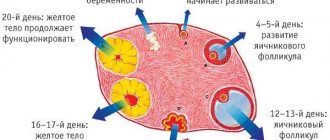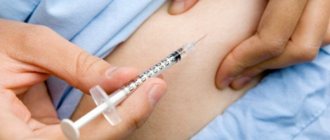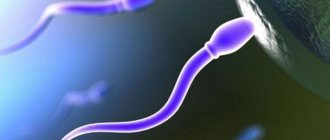Author's rating
5
Author of the article
Daria Polevaya
Practicing general practitioner with 7 years of experience. I love my job and try to constantly improve my skills.
Articles written
42
What is ovulation and when does it occur? How many days after ovulation does your period come? These questions often arise in families where they are planning to have a child in the near future. Let's deal with everything in order.
The menstrual cycle is one of the most important biological processes in the female body, which reflects the level of female health and her ability to procreate. Its essence lies in the onset of cyclically repeating changes in various organs and systems of a woman’s body under the influence of sex hormones. The average cycle of a healthy woman is 28 days, although it is possible to shorten it to 23, or lengthen it to 35 days, but if it occurs regularly, then this is considered a variant of the norm.
Signs of lack of ovulation
There are signs that there was no release of a mature egg in this monthly cycle.
- tests for lutein-containing hormone are negative;
- the level of progesterone in the blood does not increase;
- The dominant follicle and corpus luteum are not visible on ultrasound;
- the consistency and amount of cervical fluid does not change;
- there is no jump in basal temperature for three or more cycles in a row;
- no engorgement of the mammary glands, pain in the lower abdomen or ovaries;
- there is no increased sexual desire and brightness of sensations during sexual intercourse.
No increase in sexual desire in the middle of the cycle in the absence of ovulation
How not to miss and prevent early ovulation?
In general, if you do not use a calendar method for contraception or are not planning a pregnancy, a shift in ovulation, by and large, will not affect your life and health in any way. But if you are prescribed IVF in a natural cycle, on the recommendation of a doctor you must take medications strictly after ovulation, or you still naively believe that it is impossible to get pregnant immediately after your period, then an earlier than expected release of the egg from the follicle may be a problem. you are in for a very unpleasant surprise.
Therefore, in order not to miss the onset of ovulation, you need to carefully monitor your body. To do this you can:
measure basal temperature;
- monitor vaginal discharge;
- carry out tests based on determining the surge of luteinizing hormone (urine ovulation tests);
- do folliculometry (ultrasound assessment of follicle growth in the ovaries);
- monitor the level of hormones in the blood (LH, FSH, estradiol and progesterone).
The first two methods are free, but not reliable enough, and the last three will take up a lot of your time and money, but will allow you to determine with a high degree of probability the most favorable time to conceive a baby.
In addition, to prevent a sudden “failure” from occurring in your body, you should not radically change your lifestyle, abuse alcohol and smoke, avoid overwork and excessive stress, sharply change climatic conditions, strive to quickly lose weight and take any medications without a doctor’s recommendation . If you are scheduled for an IVF procedure in a natural cycle, then in order to increase its effectiveness, the doctor may inject you with a hormonal drug that inhibits the release of the egg earlier than necessary.
And remember that ovulating prematurely is not a disease. Therefore, watch your body and be healthy!
Do you have periods without ovulation?
If the maturation of eggs is disrupted, they are not released from the follicle, but menstrual-like bleeding persists. And although the growth of the endometrium in the uterus occurs as usual, the corpus luteum does not form during anovulatory cycles.
If the menstrual cycle lasts from 24 to 30 days and the period comes on time, the woman probably does not have problems with egg maturation. If menstruation has become more scanty, irregular, the cycle becomes shorter or longer, most likely these are anovulatory cycles.
In some women with ovulatory pathology, cycles not only become irregular, but also disappear completely. It is imperative to consult a gynecologist.
Sex while taking oral contraceptives during menstruation
Such contraceptives are completely hormonal drugs, which means they have a 100% guarantee of preventing fertilization. These tablets contain:
- Ethinyl estradiol;
- Estrogen.
These two substances can block the ovulation process, and without ovulation, pregnancy is impossible. Oral contraceptives, which have a different effect, reduce the amount of ecclesiastical mucus, preventing sperm from moving up the vagina to the uterus. Without blocking the release of the egg, they are less effective. Their advantage is that there are no contraindications and they are taken mainly by nursing mothers and women over 40 years of age. Taking birth control pills and having sex during menstruation prevents a woman from becoming pregnant. The main thing is to comply with the conditions for taking contraceptives and not violate schedules.
It will come in handy!
Determining pregnancy: https://sowetu.ru/read/kak-pravilno-sdelat-test-na-beremennost.html
If ovulation does not occur: reasons for the absence
If a woman has lost ovulation, the reasons can be both physiological and psychological. Usually they are complex and require a delicate approach and mandatory examination and treatment by a gynecologist and psychotherapist.
Lack of ovulation during regular periods can be caused by:
- hormonal imbalances;
- acute mental trauma;
- physical overload;
- rapid weight loss or gain;
- poor nutrition, fad to diets;
- change of place of residence, work, study;
- climate change when moving to another country.
No ovulation due to excess weight loss
Healthy and young women may experience anovulatory cycles for psychological reasons. These could be financial, housing difficulties or family problems.
Disturbances in the process of maturation and release of the egg are quite widespread; about 40% of married couples experience it. Some of these cases are related to the individual characteristics of the body and are not permanent. This phenomenon is temporary and should not cause any concern.
Ovulation disorders also occur due to gynecological diseases, hormonal disorders or congenital pathologies of the reproductive system.
How anovulation can cause infertility
Anovulation is perhaps the main cause of infertility . If a woman has impaired ovulatory function, she is unable to become pregnant for the simple reason that the egg is missing, which means that the sperm will have nothing to fertilize.
Irregular ovulation (when an egg does not mature in every cycle) also reduces the chances of successfully conceiving a child . Firstly, the egg itself may not be of very good quality, which will not have the best effect on trying to get pregnant. Secondly, anovulation is associated with a woman’s hormonal imbalance.
In turn, this leads to the emergence of no less serious pathologies that negatively affect the ability to conceive a child: changes in the thickness of the endometrium, lack of progesterone, luteinizing and other hormones.
Menstrual cycle without ovulation on basal temperature charts
A cycle in which a mature egg is not released due to hormonal imbalance - increased prolactin:
Below is a graph of the basal temperature of a woman on a strict diet:
Basal temperature chart - no ovulation due to excess weight loss
And this is the schedule for a woman with normal ovulation. During this cycle, the ovaries rested and there was no release of an egg. If repeated two to three times a year, it is considered normal and does not require treatment:
Anovulatory graph of basal temperature in a healthy woman
Sex during your period
Practice and observations of women's behavior have shown that it is at this time that a woman experiences the greatest sexual arousal. This happens because the body experiences a hormonal imbalance. Testosterone levels in the blood increase significantly. In addition, blood flow to the female genital organs increases, making them much more sensitive. Many couples believe that, for ethical reasons, it is worth abstaining from sexual contact during menstruation.
This is interesting:
From time immemorial, a woman experiencing menstruation was considered “unclean” and was even isolated from society.
But not everyone agrees with this, and there are couples who confidently have sex on “these” days. From the point of view of doctors, such sex can be dangerous. This is because the vagina is extremely prone to the spread of infections at this time. Both partners are not immune from inflammation of the genital organs, especially the female ones. During menstruation, the uterus is slightly open and any sexually transmitted disease can enter its cavity and appendages. Therefore, you can only have sex during this time if you are completely confident in your partner's health. Then sex will be safe.
If there is no ovulation: what to do to get pregnant?
According to WHO, successful conception in a healthy couple should occur within a year of regular sexual activity without contraception. If pregnancy does not occur, a comprehensive examination of the husband and wife is necessary.
Anovulation is not always the root cause of infertility; perhaps there are other pathologies, for example, the husband’s sperm has low rates of fertilizing ability of sperm. If the spouse’s spermogram is within the normal range, you need to look for the cause in a violation of female reproduction.
To determine the reasons for the lack of ovulation, a woman is diagnosed
Diagnosis of ovulatory function disorders:
- The content of thyroid hormones, FSH, LH, progesterone and androgen on certain days of the cycle is determined;
- On the 10th-14th day of the cycle, an ultrasound examination is performed to monitor whether the dominant follicle is maturing (folliculometry).
- The doctor prescribes an ultrasound of the uterus and ovaries to determine the shape, size, condition of the uterine cervix and exclude polycystic disease. With successful ovulation, ultrasound, which is performed in the second phase of the cycle, visualizes the corpus luteum and free fluid in the retrouterine/posterior cervical space in one of the ovaries.
- The patency of the fallopian tubes must be determined (x-ray with the introduction of a contrast agent or laparoscopy);
- Control measurements of basal temperature are prescribed within six months.
What happens after the egg is released?
After ovulation, changes begin in the female body. This period is characterized by the production of stress hormones.
The nervous system enters the active stage. After the follicle ruptures, the corpus luteum begins to produce progesterone. From the 20th day of the cycle, testosterone is activated. With its action, weakness and apathy are not excluded. Before menstruation, many people feel quite calm.
At the same time, restructuring is again observed. The body prepares for endometrial rejection if conception does not occur.
Often, women begin to feel a tummy tug, and this sign is one of the most important in the matter of the onset of menstruation. The breasts also swell due to the increasing concentration of prolactin. During this period, weight may increase slightly.
All these factors cannot but affect your mood. A woman does not want to decide anything and take initiative. She would be more suited to watching a melodrama, where the heroes have a far from easy fate. After the end of menstruation, everything returns to normal.
Important! If approximately the same changes are recorded during the cycle, then everything is in order with the internal processes. You should worry when pain occurs during ovulation.
Problems with ovulation and their solutions
Restoration of ovulatory function is carried out as follows:
- if the cause is obesity or, conversely, very low body weight, then normalizing weight or changing the physical training regimen restarts the ovulatory process. BMI - from 18 to 29 (ideally up to 25) is a good indicator and ovulation is theoretically possible. A BMI of 30 or more must be reduced to become able to give birth to a child;
Norms for the percentage of fat in a woman’s body to normalize the menstrual cycle and restore ovulation
- correction and restoration of normal functioning of the thyroid gland and adrenal glands is carried out;
- according to indications, hormone therapy is prescribed aimed at reducing the amount of prolactin and the concentration of androgens in the blood plasma;
- a course of OK is prescribed most often for three months to give the ovaries the opportunity to rest and recover;
- a special diet and lifestyle changes are involved, which helps regulate ovarian function and promotes pregnancy naturally.
- Diagnostic laparoscopy helps not only to accurately determine the cause of anovulation, but also to correct the situation right on the spot (it was thanks to it that I became pregnant twice).
Often, after stopping oral contraceptives, two ovaries ovulate at once, which, under favorable conditions, leads to the birth of twins.
There are also folk ways to stimulate the development and release of the egg, but first it is necessary to exclude gross pathology.
Drug treatment
Common methods of treating anovulatory dysfunction are the use of medications to promote conception. A drug such as Clostilbegit is effective, causing ovulation in 80% of patients within six months after treatment. However, the use of fertility enhancing drugs is possible as prescribed by a specialized specialist . If treatment turns out to be ineffective (with low ovarian reserves), successful pregnancy is possible only with the help of IVF .
When is it better to have sex: at the end or beginning of the cycle?
You also need to pay attention to such a question as “The most favorable time for conception during menstruation.” This is very important, because it is in the first 2–3 days that they are “unsuccessful” for conception, due to heavy bleeding. For the same reasons, sex is also impossible these days. If a woman still believes that she became pregnant in the first days of menstruation, then she is definitely mistaken. Most likely, fertilization occurred before the onset of menstruation itself.
This is interesting:
What women often mistake for menstruation is most likely in such situations the slight bleeding that occurs for many in the first steps of pregnancy.
The last days of menstruation are characterized by light bleeding. A small amount of discharge is the release of the egg itself. On such days, especially if the cycle is prolonged or irregular, you can easily get pregnant. In addition to this possibility, bloody bodies are a breeding ground for bacteria that can aggravate the situation of fertilization and “give” diseases to the fetus. Gynecologists insist that every sex during menstruation be protected with:
- Condom;
- Oral contraceptives;
- Intrauterine devices.
Symptoms
Since the risk of getting pregnant during menstruation develops against the background of spontaneous ovulation, which in turn can occur on any day of the menstrual cycle, it is advisable to classify the symptoms of normal ovulation as this condition. If characteristic manifestations occur ahead of schedule or are repeated after a short period of time, then there is a chance that the woman will pay attention to the maturation of two eggs.
Symptoms of approaching ovulation are considered to be:
- swelling, soreness and increased sensitivity of the mammary glands;
- sudden mood swings;
- headaches of varying intensity;
- swelling;
- increased sexual attraction to the opposite sex;
- change in the nature of discharge;
- exacerbation of visual, olfactory and taste sensations.
Directly during ovulation, the above signs are joined by:
- pain in the lower abdomen, often on the side on which the ovary is located, where ovulation takes place, including spontaneous ovulation.
- violation of the act of defecation - it should be taken into account that some may experience constipation, others may experience diarrhea, and others may experience an alternation of such manifestations.
- irradiation of pain to the lumbar area.
- increased gas formation.
- change in body weight.
- general malaise.
- muscle pain.
- increase in appetite.
- acne-type rashes.
- sleep disorders.
- causeless stress.
- attention disorder.
- memory loss.
- problems with concentration.
- bloating.
- the appearance of characteristic discharge.
The prolonged presence of the above manifestations and the non-occurrence of menstruation, as well as repeated periods of expression of such symptoms, may indicate spontaneous ovulation. However, in the vast majority of cases, the maturation of the second egg goes unnoticed.
Etiology
The most harmless reason that two eggs mature in the body during one menstrual cycle is the experience of a strong orgasm during sexual intercourse with a sexual partner.
However, such a failure can be caused by changes in hormonal levels, and the following predisposing factors may serve as reasons for this:
- long-term influence of stressful situations and nervous overstrain;
- excessive physical activity or, conversely, its complete absence in a woman’s life;
- uncontrolled use of certain medications, in particular hormonal substances, antibacterial agents or oral contraceptives. It is this reason that most often leads to the fact that a woman can become pregnant during the menstrual cycle, and this is often an undesirable situation;
- lack of proper control over this type of contraception such as the intrauterine device. Despite the fact that this is one of the most common methods to prevent pregnancy, it cannot absolutely guarantee the fact that the fairer sex is completely protected from unplanned motherhood during menstruation;
- the presence of chronic gynecological pathologies;
- acute course of colds;
- excessive addiction to herbal medicine - this only indicates that treatment with traditional medicine must be prescribed and approved by the attending physician, otherwise it may become a source of unwanted pregnancy;
- individual characteristics of the female body;
- eating disorders;
- injury to the organs of the reproductive system;
- artificial stimulation of ovulation in females during menopause - this can be achieved with the help of hormonal medications. They turn to a similar procedure in cases where a woman wants to become a mother, and conceiving a child during menstruation is her only opportunity to do this.
In addition, long periods or a short cycle can affect the appearance of spontaneous ovulation. Normally, critical days should last less than eight days, but due to the influence of various factors, this period may increase. Moreover, the chance of conception during menstruation increases in cases where the cycle is less than twenty-three days. This is due to the fact that new ovulation may occur at the same time.
Also, some conditions in the female body allow sperm to extend their lifespan for several days, which, with spontaneous ovulation, leads to fertilization of the second egg.
In addition to the above reasons, the following factors can affect the maturation of two eggs:
- dysfunction of the ovaries or pituitary gland - such organs are responsible for the production of hormones.
- genetic predisposition - some clinicians believe that the ability to spontaneously ovulate is inherited.
- age category - experts note that such a disorder, which is positive for some and negative for others, is most typical for young women.
It is worth noting that spontaneous ovulation can take place both in the ovary where the first one occurred, but with a break of no more than three days, or in two ovaries at the same time.











